Fresh from racing in the 40-44 category at the European Championships in Kitzbühel, Austria, age-grouper Ollie Hart sent us the following account of what it takes to get onto the starting line as Team GB age-grouper…
Kitzbühel really did feel like one of the pinnacles of my life. Not only because of the opportunity to represent my country, but because it represented the peaking of a huge range of factors. Some of these long term and slow growing, and others nurtured more recently.
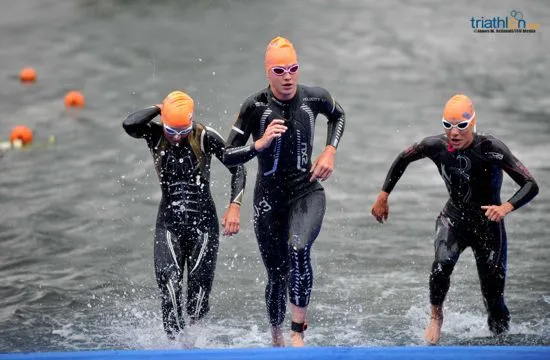
Here is a list of some of these factors that got me to the start line in great shape, raring to go:
1. Firstly an underlying desire to live life to the full, be active and stay fit. Helped enormously by having encouraging parents, and a supportive upbringing with plenty of opportunity to enjoy sport.
2. The gift of a physique that lends itself to tri. Although I think just about everyone could train themselves up with enough motivation, it helps if you were born a lanky streak of piss (miserable as a teenager, but a blessing in your 40s!)
3. An interest in multisport. It helps if you know others who do it, or want to share your journey of discovery, but a 'have a go' attitude is all that's needed.
4. Cash! Although mags say you can get into triathlon for a mere £1,000, when you consider all the gels and drinks, entry fees, and travel expenses (on top of the basic kit) you do need a bit of disposable income. This is probably why the 35-50 age-groups are the most heavily contested.
5. Train hard. Be focused (selfish) enough to prioritise your self-betterment above family breakfasts and a Saturday morning lie-in with your wife (bonus if she realises this is one of the things that makes you tick and supports you). Enough dedication to push through winter rain and darkness.
6. Qualify – you have to join and register your intention with British Triathlon Association for a specific qualifying race, and do well enough to make the cut.
7. More cash – once selected you have to pay entry fee, book flight and hotel, and buy Team GB kit (well worth it for the feeling you get when you first pull it on)
8. More training – with the prospect of representing your country most people up the ante, requiring ever more sophisticated juggling of work, family and social life.
9. Avoid injury. Bearing in mind the above, it can be easy to push up your intensity and volume with patriotic zeal. I found the advice of an online coach helped ( more expense, but well worth it – and after all, “I deserve it now I'm an international athlete!”)
10. Source a bike box, and learn how to dismantle your bike (which way do those pedals unscrew?!); double check with the airline that they will carry it (you don't need worrying lines like, ‘We can't always guarantee we'll fit on oversize luggage’).
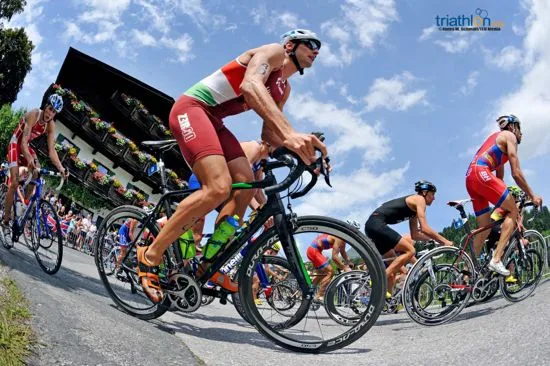
11. Book car parking at the airport – another hidden expense easily forgotten.
12. Pack – don't forget all the kit, bike shoes, running shoes, helmet, number belt, wetsuit, tri-suit, elastic bands for bike start, pump, multitool for reassembly, gels, drinks bottle (primed with powder for race day drink), goggles..... Oh yes and race licence, passport, driving licence…
13. (Unlucky for some) Avoid last-minute illness, especially as work commitments have a habit of peaking just before a trip. Good sleep, regular eating, and avoiding virus-infected children and colleagues can all be challenging aspirations in the final build up.
14. Get up early enough to drive to the airport, negotiating rush hour traffic around Glossop. Why is traffic always busiest when you are rushing for a flight?
15. Persuade the car park bus driver to take your bike box, even though he's 'not really allowed to anymore’.
16. Negotiate airport crowds with 30kg 'head turner' bikebox: ‘You got your granny in there mate?'
17. Keep your fingers crossed your delicate carbon fibre speed machine survives those brutal baggage handlers, assuming they put it on the right plane… Phew it made it.
18. Collect the hire car – will the bike box fit?
19. Remember to drive on the correct side of the road, and successfully follow your AA downloaded directions from airport to hotel.
20. Reassemble your bike, without shredding any threads, over tightening, under tightening or trashing your hands.
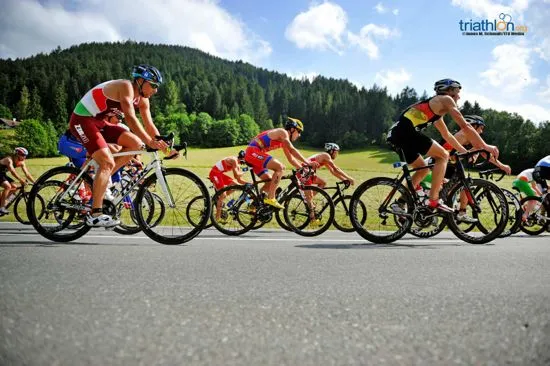
21. Sneak your 'baby' (bike) past the receptionist to squirrel away in your room.
22. Register for the race pick-up, race number and chip etc.
23. Suss out the course and transition requirements, and avoid too long on your feet at the expo or supporting other athletes on the day before your event (especially if Alistair Brownlee is defending his European title).
24. Stick on all your stickers – helmet, bike, drop-off bag.
25. Last practice of getting in and out of bike shoes on the move, in hotel underground car park (too weird to do in public)
26. Drive to venue and rack your bike in transition.
27. Stay hydrated, and full of carbs.
28. Last supper – not too heavy – bowels are now set to 'anxiety’, the opposite of 'digest’.
29. Lay out all your kit on the floor of your hotel room. Last practice getting out of your wetsuit.
30. Plug in your running watch.
31. Set alarm (too early)…
32. Lie in bed with heart pounding…
33. Recheck alarm.
34. Six hours sleep, no dreams of punctures..... That’s good.
35. Lie in bed, mentally prepare for the day, think through all the events and transitions.
36. Open your ‘To be opened on the morning’ card from wife, and poem from nine-year-old daughter… Realise you have won much much more than the race already.
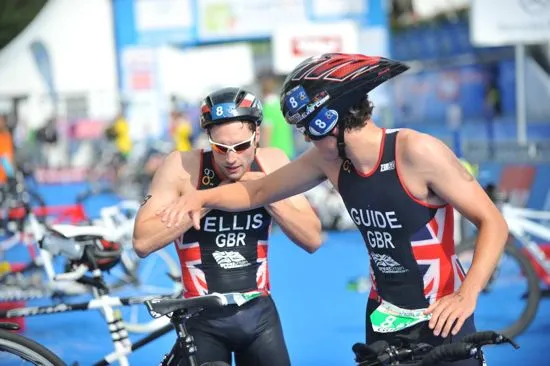
37. Drive to event and find a car park space
38. Final set up in transition. Remember to put bike in a low gear. Get useful advice from more experienced athletes, 'Don't put any more air in your tyres, they'll pop when it warms up.’
39. Two hours to the start. Coffee and chill/soak up the atmosphere, gentle bubbling of anticipation by the milling crowd. Get one of those ‘How lucky am I to be alive moments'.
40. Try and block out AC/DC on the tannoy. Too loud for this stage of focussed anticipation, maybe in an hour.
41. Watch earlier starts, suss out where you think the best starting position will be for the swim.
44. Get into wetsuit. Drop off bag in secure area.
45. Final gel. Gentle warm up. Nerves buzzing, but you keep reminding yourself not to get too excited, stay focused on the task ahead, but savour that electrifying buzz of knowing you are just minutes away from the goal you have worked five months for.
46. Into the pre-race holding pen. Make sure your swim cap is in the right position, and your googles are 'spit-primed' to stop them fogging (still being able to produce some saliva is a good sign!) and well adjusted. You don't want any leaks on the swim.
47. Onto the start pontoon. Get into the position in the line-up you've decided will suit you best. Now you want to inhale it all, the crowd, the other competitors, the race buoys in the distance, the music, the sunshine....
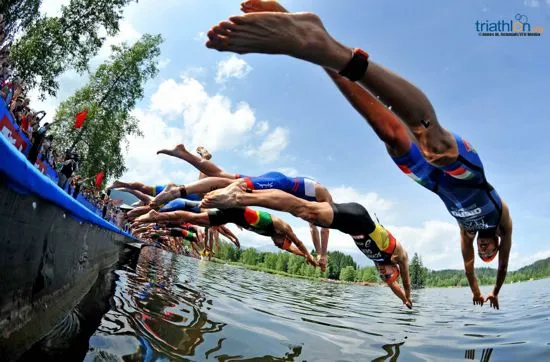
48. In the water, this is it, COME ON!
49. 'On your marks', horn, EXPLODE!
(All images: Janos Schmidt/ITU)
Did you race in Kitzbühel? How did you get on? Let us know in the comments below!